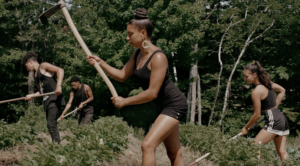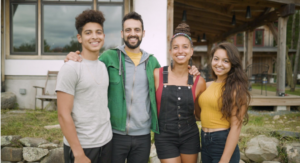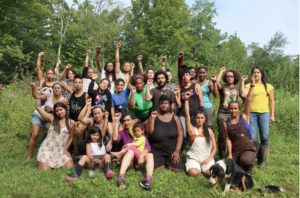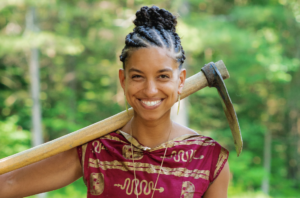Final Project – Leah Penniman & Soul Fire Farm Profile




This one page document will serve as an abstract overview of my profile of Leah Penniman and Soul Fire Farm. Leah Penniman is a Co – Founder, and the Co – Director and Farm Manager at Soul Fire Farm in Albany, New York. She has a wide range of leadership roles at the farm, including international solidarity work, speaking, and writing, as well as farmer training, perennial care, farm labor, and soil quality (Soul Fire Farm, Penniman, 2021). Penniman has worked as a food sovereignty activist and soil steward for over 20 years. She has worked on a number of farms and projects, including the Food Project, Farm School, Youth Grow, and Many Hands Organic Farm, as well as internationally in Mexico, Ghana, and Haiti (Soul Fire Farm, Penniman, 2021). Penniman is also an author. Her book, Farming While Black: Soul Fire Farm’s Practical Guide to Liberation of the Land, was published in 2018. The book’s purpose is to serve as a guide to sustainable food and farming, and to “find, buy, and make productive, sustainable use of land in accordance with traditions and in a manner that prioritizes healing and dignity.” (Bierend, 2018). It describes the nuts and bolts of sustainable agriculture, such as preserving food, crop rotation, and using raised terraces and beds, combined with Penniman’s research into the origins of common sustainable practices. She was inspired by conversations with Karen Washington (who later became a mentor) and by her own realization that farming techniques that are considered sustainable, modern, and of European origins in current times, such as permaculture and agroforestry, often actually have roots in Black, Indigenous, and People of Color (BIPOC) agricultural practices that can be traced back to multiple continents and hundreds of years (Bierend, 2018).
Penniman identities as a Black Kreyol person. She experienced racist and ruthless bullying as one of the few Black students in her schools (Boscamp, 2019). One of her coping mechanisms was to spend time in the forest in order to feel peace and connection to the land (Boscamp, 2019). In addition, Leah identifies as a genderqueer/multigender person. Penniman’s experiences with racism, marginalization, systemic oppression, and other forms of discrimination have informed and shaped her outlook on life, morals, her goals for SFF, and her activism.
Soul Fire Farm was founded in 2010 by Leah Penniman and her husband Jonah Vitale – Wolff with the goal of “reclaim(ing) our inherent right to belong to the earth and have agency in the food system as Black and Brown people (Soul Fire Farm, Penniman, 2021) SFF has multiple primary categories of action – farming, training, education, and activism. The farm employs a wide range of BIPOC and ancient farming techniques, including Afro-indigenous agroforestry, wildcrafting, polyculture, silvopasture and spiritual farming practices, as well as more common techniques such as no-till, cover crops, and a compost/manure system, and raised beds (Soul Fire Farm, 2012). They also work to protect and incorporate native and “African heritage” crops through planting and seed keeping. The farm focuses on the health of the land and soil while producing livestock (pasture – raised), honey, mushrooms, vegetables, fruits, plant medicines, and preserves. Nearly all of SFF’s food is distributed to the local community using a CSA model that uses a sliding scale payment system and is delivered directly to farm share members weekly (Boscamp, 2019). They are very proud of the results of their trainings and programs, which include at least 3 farms located throughout the country founded by graduates of SFF and 85% of SFF graduates maintaining food justice and/or farm related work following the program.
Soul Fire Farm and its work exists as a powerful rebuke of the status quo. Due to slavery, the Jim Crow era, the Great Migration, systematic and systemic racism, environmental racism, food injustice, redlining, and countless other discriminatory local, state, and federal anti – Black policies aimed at disadvantaging or harming Black people economically, socially, culturally, politically, and environmentally, Black people have faced a wide range of food and farm related issues and struggles. This is evidenced by decades of discrimination against Black farmers, the disproportionately small percentage of Black farmers, and the frequent lack of healthy, affordable, and culturally appropriate food in Black communities.
Works Cited
Americans of Color Largely Excluded From Producing and Eating Fresh Food. (2018, November 8). The Counter. https://thecounter.org/food-apartheids-farming-while-black-leah-penniman-soul-fire-farm-interview/
Farming While Black: Soul Fire Farm’s Practical Guide to Liberation on the Land
Penniman, L., & Washington, K. (2018). Farming while Black : Soul Fire Farm’s Practical Guide To Liberation On The Land. Chelsea Green Publishing
Farming while black: How 1 Mother is Fighting to End Racism in the Food System. (n.d.). TODAY.Com. Retrieved May 4, 2021, from https://www.today.com/food/leah-penniman-started-her-own-farm-end-racism-food-systesm-t167046
Farming Practices. (2012, April 14). SOUL FIRE FARM. https://www.soulfirefarm.org/theland/farmingpractices/
Gilbert, J. C., Sharp, G., & Felin, M. S. (2001). The decline (and revival?) of black farmers and rural landowners: A review of the research literature [Working paper]. Land Tenure Center, University of Wisconsin-Madison. https://minds.wisconsin.edu/handle/1793/21927
Group, E. W. (n.d.). Timeline: Black Farmers and the USDA, 1920 – Present. Retrieved May 4, 2021, from https://www.ewg.org/research/black-farmer-usda-timeline/
Horst, M., & Marion, A. (2019). Racial, ethnic and gender inequities in farmland ownership and farming in the U.S. Agriculture and Human Values, 36(1), 1–16. https://doi.org/10.1007/s10460-018-9883-3 (https://link.springer.com/content/pdf/10.1007/s10460-018-9883-3.pdf)
Hinson, W. R., & Robinson, E. (2008). “We Didn’t Get Nothing:” The Plight of Black Farmers. Journal of African American Studies, 12(3), 283–302. https://doi.org/10.1007/s12111-008-9046-5
How USDA distorted data to conceal decades of discrimination against black farmers | New Food Economy. (2019, June 26). The Counter. https://thecounter.org/usda-black-farmers-discrimination-tom-vilsack-reparations-civil-rights/
Leah Penniman Keynote Speech – Moses Organic Farming Conference (2020)
Moses Organic. (2020, March 4). Leah Penniman Keynote 2020. https://www.youtube.com/watch?v=zvQJP8QP-Ng
Leah Penniman. (2020, October 12). SOUL FIRE FARM. https://www.soulfirefarm.org/meet-the-farmers/leah-penniman/
Pronouns for Leah // pronombres de Leah. (n.d.). Google Docs. Retrieved May 4, 2021, from https://docs.google.com/document/d/13e5h2YQ98P_uStshda1xcvNNcOiNvB9jSU8g1LE7HUI/edit?usp=embed_facebook
Soul Fire Farm Website – 2020 Annual Report 2020 Annual Report. (2019, January 6). SOUL FIRE FARM. https://www.soulfirefarm.org/about/annualreport/
Reynolds, B. J. (2003). Black Farmers in America, 1865-2000: The Pursuit of Independent Farming and the Role of Cooperatives (No. 1502-2016–130760). AgEcon Search.
https://doi.org/10.22004/ag.econ.117049
White People Own 98 Percent of Rural Land. Young Farmers Are Asking for It Back. By Bite on PRX. (n.d.). Retrieved May 4, 2021, from https://beta.prx.org/stories/326852
https://www.melodyloops.com/music-for/podcasts/
Photo Sources
https://assets.vogue.com/photos/5efe21f05838dcb7d3dfb961/16:9/w_3663,h_2060,c_limit/001-RS_SoulFireFarm_CourtneyYates_Finals.jpg
https://nbcnews.shorthandstories.com/leah-penniman-soul-fire-farm/
https://nbcnews.shorthandstories.com/leah-penniman-soul-fire-farm/
I liked how the podcast started off with a quote from the subject making them no stranger! I also enjoyed how there was a quote included from Lisa! I knew that African slaves had brought crops from Africa but didn’t know that young women would braid them into their hair. I learned about the cleverness, resilience, and resistance of these young women.
From the podcast earlier in the semester, I knew about black Africans and their knowledge of agriculture was strong and a lot times of what the white slave owners leaned on for success. It was nice though to hear more about how Penniman uses these ideas to do great work at soul fire farm. I also really enjoyed the included recordings of her. It kept me engaged.
I really liked that you began with the quote and also even with a personal speech from Leah Penniman. This was my first time learning of the details of Soul Fire Farm, and it was so interesting to learn about Penniman’s history in activism and how this led her to the founding of Soul Fire Farm. As this course is very liberal-arts focused, I liked that race was incorporated into your podcast as you talked about the life of Leah Penniman and the racism that she faced as a Black Kreyol woman, as well as her experiences as a queer person. We have incorporated the topic of racism into our conversations a lot this semester, so your podcast was a great culmination of these discussions.
I really liked this podcast, and how you incorporated quotes from Penniman and Lisa! I was also excited to hear that she worked at the Food Project because that’s where I worked throughout all of high school, and I had no idea she did as well! This podcast did a great job of keeping me engaged, and I learned a lot about Soul Fire Farm, which I hadn’t known much about before.